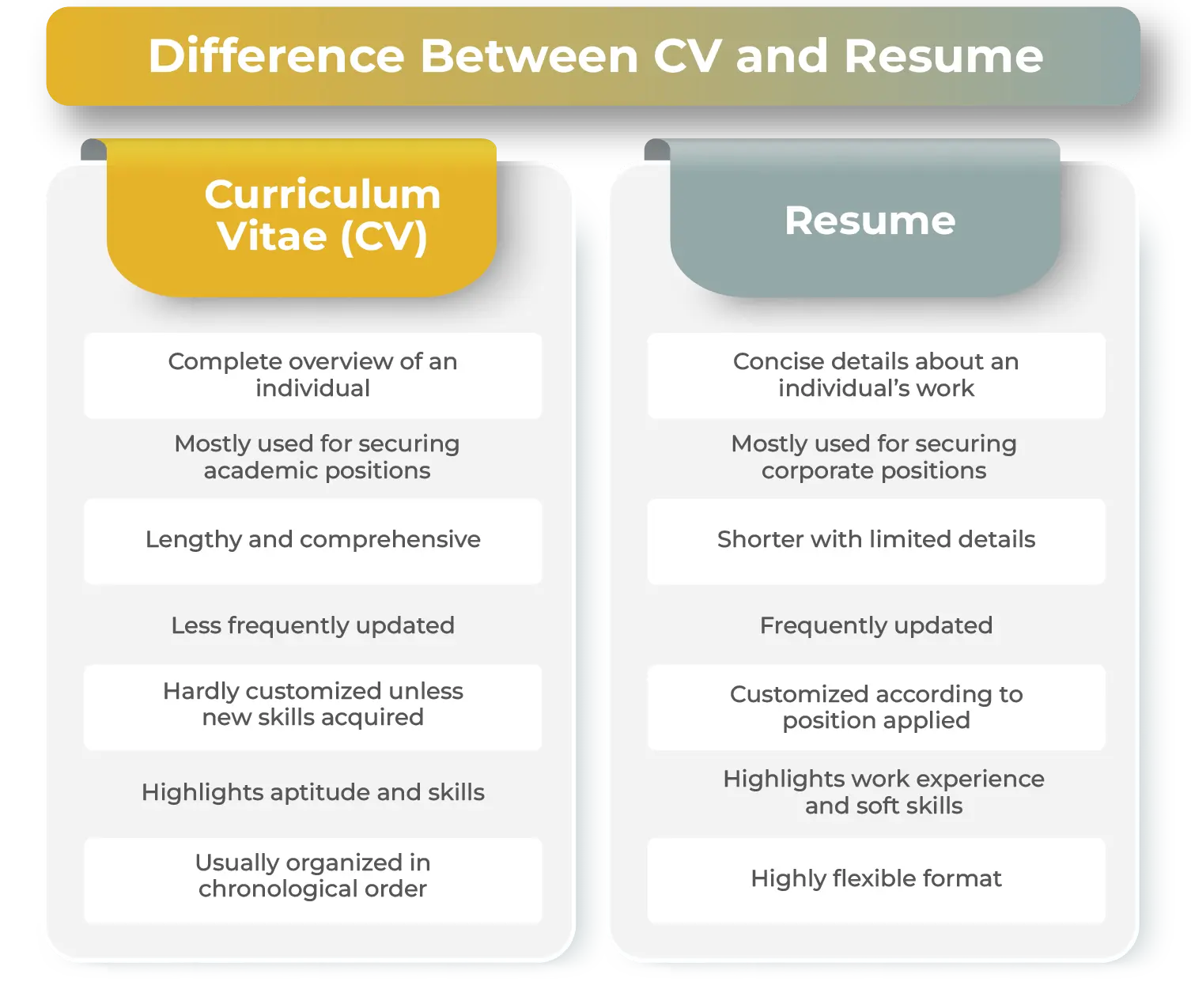CV and a resume are interchangeably used terms that have distinct characteristics in terms of purpose, length, geographic location and so. Although the intention of both the document is same that is to showcase an individual education, achievements and work experiences. Both documents are considered as a primary gate pass for getting shortlisted for the interviews or verbal communication for jobs and so on.
While applying for a job, the foremost document sent to the recruiter is a CV or a resume which highlights the basic aspects of an individual including the strengths, weaknesses, total years of experience, additional experiences, and indeed personal details such as contact details, date of birth, etc.
In this blog, we will give you a comprehensive understanding of the CV and resume as well as will give you an insight into the difference between CV and resume.
What is the Difference Between CV and Resume
A CV provides a detailed overview of a person’s educational background and professional experience, while a resume is a concise summary of relevant skills and experiences.
Now that we know the meanings of a resume and a CV, Let us understand in detail about CV and resume difference or the difference between CV and resume by comparing CV vs resume.

Difference Between CV vs Resume
| Aspect |
Curriculum Vitae (CV) |
Resume |
| Definition |
A CV is a comprehensive document that details your academic history, work experiences, references, certifications, awards, skills, honors, etc. It gives an insight into the career choices, achievements, and accomplishments of an individual. |
A resume is a professional document that highlights the relevant skills, qualifications, hobbies, and work experiences of an individual in summary. It gives a gist of an individual’s career. It is not lengthy and usually is a summarization of an individual’s professional accomplishments. |
|
Purpose |
A curriculum vitae (CV) is mostly used for your application in research and academic positions, in scientific fields, fellowships, grants, and academic funding as well as in international applications as in foreign countries “CV” is the most used term for highlighted biography of an individual. |
A resume is used when applying for a job in corporate or government. It works as a marketing tool to emphasize your relevant skill and qualifications that catches the hiring managers’ attention. It is tailored to match the job requirements of the postings available. |
|
Length |
It is a lengthy and comprehensive document that contains the details of an individual’s academic and professional work experience. |
It is shorter and only contains the relevant skills, qualifications, and work experiences of a candidate.
|
|
Geographic Differences |
In countries like the USA and India the term CV is used as a comprehensive document and resume as a shorter document or a summary of relevant skills. |
In countries like Canada, the word resume is predominantly used. |
|
Customization |
CV is a comprehensive report and cannot be customized much except for the additions of updated skills, learnings, and new awards as well as accolades. So it is less customizable |
Resumes are highly customizable and are customized as per the company’s job role requirements to highlight relevant skills and education. |
|
Content |
The content of a CV contains a detailed and updated history of employees’ educational as well as professional accomplishments. |
The content of a resume only contains the summary of an individual’s recent and most relevant skills as per the company’s vacancy needs. |
|
Usage |
Used for experienced professionals to highlight their achievements and works. |
Used for freshers, or professionals with lesser experienced and also for corportae professionals to highlight their key strengths and skills. |
|
Format
|
Organized in a chronological order with detailed sections. |
Flexible format to emphasize skills or experiences most relevant to the job. |
|
Updates |
Updated in frequently. |
Updated frequently to add new experiences, skills and certifications. |
|
Emphasis |
Focuses on comprehensive details on academic research, thesis, achievements, etc. |
Focuses on key skills and knowledge. |
|
Career Level |
Used by experienced professionals with a plethera of academic achievement. |
Focuses on key skills and knowledge. |
CV or resume difference are essential to consider while applying for a job vacancy and include accurate data as per its characteristics to eliminate perplexities and robust its efficiency.
What is Resume?
A resume is a shorter or concise document, which usually provides information on the summary of your professional achievements, qualifications, educational details, work experience and skills etc. It only provides relevant pieces of information that are essential to give a gist on the overall work experience and career in general of an individual.
It is usually used while applying for a specific job. The key highlights of a resume include:
- Contact Information
- Professional Summary
- Work Experience
- Education
- Skills
- Achievements
- Certifications
- strength and weaknesses
- Additional Information (hobbies, volunteer experiences, philanthropy work summaries), etc.
The above-mentioned pointers should be highlighted in a resume which should be concise and relevant rather than detailed and lengthy. A resume aims to get the attention of hiring managers, get tracked in the ATS, and secure interviews. It summarizes your professional background and presents it as a gist of your career objectives, accomplishments, and experiences to the employers.
What is CV?
A curriculum vitae (CV) is a comprehensive document that includes a detailed report of an individual’s work experience, professional achievements, academic history, etc. When applying for a research and academic position, international or higher studies opportunities, fellowships, grants, and so on the CV plays a vital role in detailing your achievements and career choices to the employer or the academic.
CV gives in-depth information about an individual’s academic as well as professional work history which enables the talent acquisition specialist to decide on the selection or rejection of the candidate. Furthermore, it also gives details of presentations, publications, certifications, awards, and recognitions additionally achieved by an individual throughout the career journey.
Curriculum Vitae (CV) is a pivotal document at the time of a personal interview as it gives a hiring manager pointers to discuss during a PI and to get an insight into the communication skills of the candidate.
To write a curriculum vitae, you can and must include the following:
- Contact details (including the professional social media links- an example of a social media can be LinkedIn, your professional blogging page, website portfolio, etc.)
- Detailed Academic background (years of passing, percentage or CGPA achieved, degrees and accolades, etc.)
- Comprehensive mentions of professional work experiences, terms of service in each company, job roles, positions in the company, etc.
- Detailed of certifications done and under which accredited authority as well as in which year.
- Published works (If any) including journals, blogs, etc.
- Awards and Honors received (Mention the years and work for which it is received as well as by which authority)
- A comprehensive list of skills (both hard and soft skills)
- Volunteer experiences (CSR activities, philanthropy works, etc.)
- References (contact information of individuals or groups of individuals who can attest to your academic and professional works).
It is necessary to include the above-mentioned pointers in detail in your CV to make it credible and also, try using your own words while framing to improve its authenticity.
Key Takeaways
In conclusion, the differences between CV and resume can be summed to be a pivotal document that highlights the skills, qualifications, hobbies, accomplishments, work experience and, objective as well as personal details of an individual. It is sent to give an insight into an individual’s professional achievements as well as personal contact details.
Although, the word is interchangeably used by people in general yet the major CV and resume difference lies in its length and purpose. Where a CV is used for academic or research work, a resume is usually shorter and is used when you’re applying for a job in corporate or so.
It is significantly essential for an individual or an applicant to understand the difference between CV versus resume to choose when to use a resume or a CV and its appropriate format as per needs, requirements, career goals, and job application preferences rather than making the silly mistake of mentioning a CV as a resume and vice versa.
Some of the other reasons for understanding CV and resume difference is in the contemporary job market where job-specific roles prevail the most, a few would require you to highlight all your goals, achievements, and qualifications in detail whereas a few others would only require the gist of your professional career.
As the saying goes “first impression lasts long”, you can put a positive impression on the employer by framing your resume or CV as per the employer’s work culture, the company’s needs, and the job you’re applying for.
Also, knowing the difference between CV and resume will help you tailor your document to avoid confusion. Your resume or CV plays a vital role in making you qualified for the next step of the interview in the interview scheduling system. It requires strengthening a CV or resume with essential data and making it proficient in getting tracked in the ATS (Applicant Tracking System) or recruitment management system.
Now that you have got a comprehensive insight into CV vs resume or CV and resume difference, make sure you frame the right document while you are applying for the job. In addition, a few significant pointers to memorize before sending a resume and a CV are:
- Make sure your resume and CV are always up-to-date (synced with your current employment status, recent achievements, current work experience, updated skills, etc.)
- There should always be a well-versed cover letter attached to your resume or CV while you are applying for a job.
- The format of a CV is different from that of a resume. So, make sure what you are sending and name the file in accordance.
- Highlight your recent or current ongoings in the first pointers (descending order).
- You should provide information that is true to your knowledge and is not copied from any other’s CV as it does not highlight your true self and the chances of rejection become highly probable.
So, if you have an intention of forwarding your CV and resume to a job posting and so, keep the following considerations in mind, and you can make a robust CV and a resume that will help it get through or get shortlisted in ATS and make you reach to the interview phase.
FAQs on Difference Between CV and Resume
1. Is a CV and a resume the same?
No a CV and a resume are not the same although both the terms are interchangeably used yet the usage of both is different.
2. Can I use my resume as a CV?
No you cannot use your resume as a CV as both have different concepts and are used at different events. CV gives a detailed report while resume is shorter and only contains the summary of your professional career history.
3. Which is good CV or resume?
Both are good in their areas of usage. If you’re applying for a job then, a resume is good as it will highlight your relevant skills as per the company’s requirements. If you’re applying for scientific or research work the CV is good. So the goodness of a CV and resume depends upon the job role, requirements of the posts, and relevancy of information needed.
4. Do freshers use CV or resume?
Mostly freshers use resumes as they usually don’t have much to share in their professional career history. Yet, a fresher with internship experiences and other volunteer work can craft a CV and use it in academic positions as well as job searches if needed.
5. Is resume letter a CV?
No, resume letter is not a CV.
6. What is the full form of CV?
The full form of CV is curriculum vitae.
7. Is resume better than CV?
The answer to this depends on the purpose of usage of both the documents and the years of professional experience as well. For a fresher a resume might be better but for an experience professional CV is better. similarly, for job search resume is good, likewise for academic positions and research works, a CV is good.
8. Is CV necessary for resume?
Your application for the job posts will specify if the CV is necessary for your resume.
9. Can a resume be two pages?
Yes, a resume can be 2 pages depending upon the customization done as per the job role application requirements and so on. In addition, those with larger work experience can have a two-page long resume to highlight their professional experiences.
10. Is a 1.5 page resume ok?
No, try to avoid a 1.5-page resume by limiting its boundaries, cropping the spaces, or limiting the words. The perfect CV should be 2 pages long otherwise, a page will do.
11. Is cv and resume same
No, both are different and have varied purposes, length as well as concept. Although both the terms are interchangeably used yet the difference between a cv and resume are significant and should be used in accordance.









